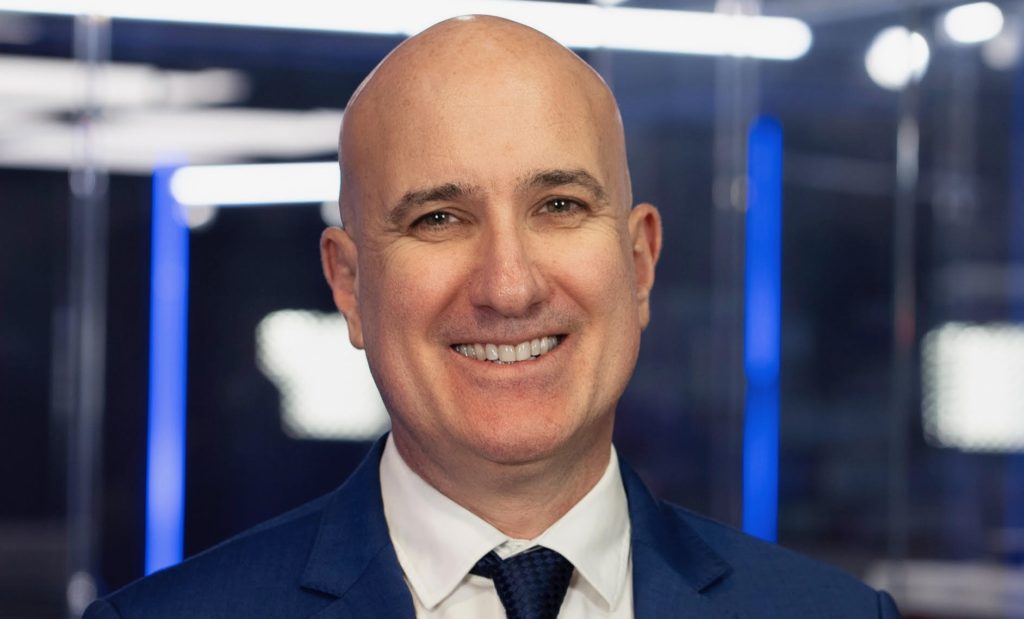Angelos Frangopoulos is CEO of GB News, the £120m TV and radio startup launched in 2021 to compete with the BBC, Sky News and (this year) News’s Corp’s TalkTV. He joined GB News in 2019 from Sky News Arabia, where he was CEO, having previously been CEO and managing editor of Sky News Australia for 22 years. He started his career in community radio and worked at various television channels, including Sky TV in London, rising through the ranks as a reporter, producer and editor. GB News became Britain’s first new rolling TV news broadcaster in over three decades. It was a rocky first few months at the end of which Discovery, which had been the initial investor, left and the station was refinanced by UK hedge fund boss Paul Marshall and Legatum Ventures, of Dubai. Frangopoulos faced down critics who sought to ‘cancel’ the channel before it was even launched by organising an advertising boycott, motivated by fears that the new network would imitate the strident Fox News, of the US. In the event, the genuine diversity of GB News viewpoints, the growth of its audience and even the launch of TalkTV have all but silenced the critics.

What were your earliest ambitions?
My start in media came at the age of 14 when I joined a community radio station in Sydney. I was one of a half dozen teenagers who produced a weekly children’s show called “Fazzo”, a word which I was assured was a cool saying at the time! To be frank, I never thought of it of anything more than a hobby and not a career and instead began studying to be a school teacher. I quickly discovered my passion wasn’t in lesson plans.
I went on to study journalism at a country university in Western NSW. My first full-time job was as a cadet in a small television and radio station newsroom. That is where I learned the importance of journalism as a service to the community, exploring issues that affect them, and giving everyone the opportunity to contribute. I was hooked from the start and have never looked back.
What were the milestones of your 22 years at Sky News Australia?
In the early years, Sky News Australia wasn’t taken seriously as part of the journalism landscape. The turning point came when we invested in serious political coverage and taking our shows around the nation to connect with audiences poorly served by metropolitan-obsessed media. Journalism has to connect with communities, so that’s what we did.
Why did you decide to join GB News?
I first heard about the plans for GB News in 2019 and I didn’t hesitate to join. It was clear there was a gap in the market for a new voice, and a new choice. Until GB News launched, there had been only two main players in the market for 34 years – Sky News and BBC News. Many Britons felt increasingly left out of the national debate, especially around the Brexit issue. Growing up with immigrant parents made me realise that not all voices get heard or included equally and, as a journalist, I care a lot about that right to be included, represented, and heard.
What’s special about GB News?
The most distinctly different thing about GB News is its warmth and personality. We talk about the GB News Family, but that’s how it feels: we’ve got different generations, different personalities, different backgrounds, and different opinions, and yet we’re bunch who are united by a sense that all views are welcome, valuable, and should be respected. Overall it’s a very accepting and non-judgmental place, and I think that comes across on air. We mean it when we say there’s no cancel culture here: no one at GB News is shunned – on or off air – because they disagree.
We include viewers in our programming in a very real way and the affection that we’ve generated among them is extraordinary. They send us thank you cards, even cheques for the licence fee, and offer to pay to support us even though we haven’t asked. Their most common phrase is that we’re “a breath of fresh air” and I think we are.
What is your own primary role?
GB News is a journalism business and I am first and foremost a journalist. It’s what I love to do and every decision I take in the business is informed by the core principles of good journalism.
What are the differences between the TV news markets in the UK and Australia?
The main ones are size, and regulation. Australia is physically bigger than the whole of Europe and yet it’s got only one-third of the population of the UK. In terms of audience, everything there is on a smaller scale but logistically it’s much harder to cover news around the country.
Broadcasting in the UK is more heavily regulated than it is in Australia. Ofcom allows for incredibly robust debate and free speech, but the obligation to provide due impartiality is key. We need to include opposing views fulsomely and respectfully, and we do. Personally, I think it’s a good thing, and we opted-in to regulation. GB News could have been a streaming-only station, where the same rules don’t apply, but we made a conscious decision to be licenced and regulated under Ofcom. Impartiality is good journalism: everyone deserves to be heard.
UK media is not a level playing field, however. Obviously the Broadcasting Code doesn’t apply to UK newspapers, which are self-regulated, so I find it curious to see some papers questioning the standards of licensed television and radio station broadcasters.
How important is the linking of TV news to radio broadcasting?
Radio is vital, and deeply important to us. It’s no accident that, within weeks of its launch in January, GB News Radio was the fastest growing radio station for British audiences. At the time, we were the only broadcaster in the country to simulcast content on television and radio. Since then, another channel has started doing the same, and I think that trend will continue.
Radio has the beauty of being transportable, and I think a lot of our viewers do just that by listening to GB News in their cars or at work, then switching on the television at home.
Simulcasting could extend to other genres beyond news and debate. A TV soap like Coronation Street would be excellent on radio, especially for fans who want to hear a storyline live but can’t get to a television for it. I think we’ll see much more crossover in future – it’s already happening with Apps and podcasts.
Audiences are becoming incredibly agnostic about how they access the content they love, and so we don’t discriminate about the platform on which we provide it. GB News is essentially a multi-media company with content served equally on television, radio, Facebook, Instagram, YouTube, TikTok, online, on Samsung Plus, Roku, and on Apps – you name it, we’re there.
GB News competes with the not-for-profit BBC News, the scarcely-profitable Sky News, and News Corp’s TalkTV. Does that worry you?
Sky News and Talk are both advertising models too. Advertisers want audiences, simple as that. GB News is much bigger than Talk (on TV and TV/Radio combined), and increasingly we’re beating Sky News in prime time. We also reach audiences that others don’t. We have bigger audiences in some areas of the UK than all the other news channels, including the BBC.
We’re also reaching different audiences. On TikTok, for instance, where we’re bigger than BBC News, we’re attracting young viewers who have not traditionally engaged with news content. We’re not stealing this audience; we’re building a genuinely new one.
Our tech is also cutting edge, and unique to the UK, which enables us to broadcast more efficiently and cost-effectively than other channels. Our system is the future of television; others haven’t caught up yet but they will. A traditional barrier to entering the television market has been cost, and it’s still expensive. But, like most other technologies, it’s developing fast and getting cheaper all the time.
Which companies do you most admire and why?
I consume a kaleidoscope of journalism and believe in the power of plurality of opinion and choice. I respect and admire any journalism business that can make a profit from high-quality, engaging content that serves its audience.
What are the best lessons you have learned?
Authenticity is essential. Audiences are canny; they can invariably spot a fake or a sycophant in the end. They know when you’re being authentic. What I’ve learned is that if you respect your audience and you’re straight with them, they respect you back.




